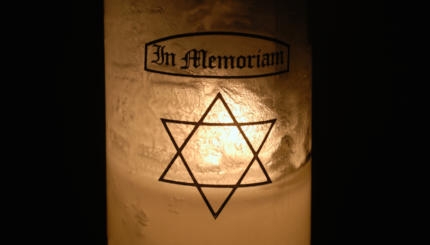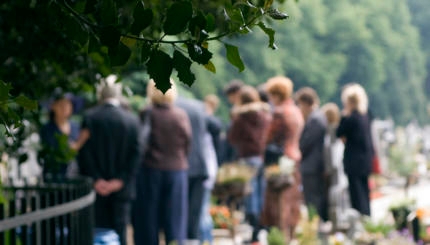In addition to the myriad Jewish traditions surrounding death and burial, there are a number of customs that are done l’iluy neshamah, to help the soul of the departed ascend to the upper realms. The best-known of these is the Mourner’s Kaddish, a prayer recited by close relatives of the deceased for up to 11 months after their passing. Another common one is giving charity, which Jews often dedicate in memory of deceased persons. One understanding of these practices is that after a person has died, they are no longer able to perform actions that can increase their spiritual merit — that is an opportunity afforded only to the living, who can perform actions on behalf of the departed that elevate their souls in the afterlife.
In some Jewish communities, Torah study, in particular the study of the Mishnah, is considered the most potent action one can perform on behalf of the souls of the departed. At least one source asserts that Torah study is many times more effective in elevating the soul than reciting Kaddish. Some consider studying Torah for the dead to be an expression of chessed shel emet, true kindness, because it represents a gesture on behalf of another that can never be repaid. Directing one’s Torah study toward the merit of the dead is effected merely by declaring it to be so.
Join the My Jewish Learning community for a day of learning on October 7, 2024, in memory of those killed on and since October 7, 2023. Beginning at 9 am Eastern time. Click here to register.
There are a number of reasons given for the special status of the Mishnah in this regard, the best-known being that the Hebrew letters that spell Mishnah — mem, shin, nun and hay — are also the four letters that spell neshamah, one of the Hebrew terms for soul. This connection is cited in the Arukh Hashulchan, a 19th-century compendium of Jewish law, which states that the learning of Mishnah is a “great tikkun (repair)” for the soul. In some communities, it’s common to study the entire Mishnah in the 30 days after a death, an undertaking that is typically split up among a number of participants so it’s more manageable.
The source of iluy neshamah is not entirely clear. The phrase itself does not appear in ancient Jewish sources, and some Jewish authorities maintain the concept itself is misguided. Maimonides, for one, seemed to believe that human beings can increase their spiritual merit only in this world. In this view, performing mitzvot and saying Kaddish for the dead are more about honoring the legacy of the departed than elevating their status in the next world. However, a contemporaneous legend about Rabbi Akiva clearly indicates that saying Kaddish can have an impact on the soul in the afterlife.

Help us keep Jewish knowledge accessible to millions of people around the world.
Your donation to My Jewish Learning fuels endless journeys of Jewish discovery. With your help, My Jewish Learning can continue to provide nonstop opportunities for learning, connection and growth.
One possible source of iluy neshamah is a passage in the Talmud that discusses why three wicked kings — Jeroboam, Ahab and Manasseh — are named as exceptions to the general rule that all Jewish people, even sinful ones, are granted a share in the World to Come. In discussing this exception, the Gemara wonders why Amon, another wicked king, was not included in the list, and answers that this is on account of his righteous son Josiah. If that’s the case, the Talmud continues, Manasseh should not be included because he had a righteous father. The Talmud then derives a general principle: A son confers merit on his father, but a father does not confer merit on his son. That is to say, a son’s righteousness redounds to the benefit of the soul of his father, but a father’s righteousness does not similarly impact a son’s soul after death. This principle could be understood to mean that righteous action by the living can impact the soul after death.
Whatever its origin, the idea of iluy neshamah is widely accepted in observant Jewish communities today. A specific acronym (לע”נ) is frequently used to indicate that a particular mitzvah is being performed for the elevation of the dead. In some observant communities, it’s not uncommon to find a sign-up sheet in a shiva house for visitors to study Mishnah on behalf of the deceased. But even in communities that don’t expressly invoke this concept, Torah study, prayer and acts of charity are often undertaken to honor the dead and mark important anniversaries.



